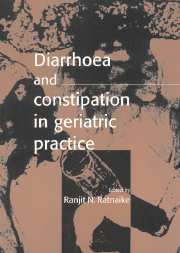Book contents
- Frontmatter
- Contents
- List of contributors
- Preface
- Acknowledgments
- Foreword by Gary R. Andrews
- I Defences of the aging gastrointestinal tract
- II Diarrhoea
- 3 Pathophysiology of diarrhoea
- 4 History and physical examination
- 5 The investigation of diarrhoea
- 6 Faecal incontinence
- 7 Drug-induced diarrhoea
- 8 Aetiology of infectious diarrhoea
- 9 Specific infectious conditions
- 10 An overview of management of infectious diarrhoea
- III Noninfectious clinical entities
- IV Constipation
- V Perspectives of altered bowel function
- Index
3 - Pathophysiology of diarrhoea
Published online by Cambridge University Press: 17 August 2009
- Frontmatter
- Contents
- List of contributors
- Preface
- Acknowledgments
- Foreword by Gary R. Andrews
- I Defences of the aging gastrointestinal tract
- II Diarrhoea
- 3 Pathophysiology of diarrhoea
- 4 History and physical examination
- 5 The investigation of diarrhoea
- 6 Faecal incontinence
- 7 Drug-induced diarrhoea
- 8 Aetiology of infectious diarrhoea
- 9 Specific infectious conditions
- 10 An overview of management of infectious diarrhoea
- III Noninfectious clinical entities
- IV Constipation
- V Perspectives of altered bowel function
- Index
Summary
In a healthy individual the frequency of bowel actions varies from three motions a day to three per week. Diarrhoea is defined as three or more unformed bowel actions in 24 hours, although this definition should not be used rigidly. Diarrhoea is also defined in terms of stool weight. Since the bulk of stool consists of water, stool weight reflects water content. In normal subjects on a western diet, the stool weight is less than 200 g/day.
In an elderly patient with a long history of constipation, a change in bowel habit to one or two loose motions warrants inquiry.
This chapter discusses the intestinal absorption and secretion of electrolytes and fluids, the regulatory processes, causes of derangement and the mechanisms of diarrhoea.
Absorption and secretion
In the gastrointestinal tract absorption and secretion of water and electrolytes occur continuously to maintain homeostasis of body fluids. Approximately 90 per cent of fluids from dietary sources, salivary, gastric, small intestinal, pancreatic and biliary secretions that amount to ten litres per day, is reabsorbed by the intestine. Most of the fluid is absorbed in the jejunum which has the largest surface area. A lesser quantity, three to five litres, is absorbed by the ileum. The colon absorbs the remainder of one to two litres but, due to its reserve capacity, can absorb up to five litres. Depending on the type of food ingested the luminal contents of the duodenum may be hypertonic or hypotonic in relation to plasma.
Information
- Type
- Chapter
- Information
- Diarrhoea and Constipation in Geriatric Practice , pp. 23 - 30Publisher: Cambridge University PressPrint publication year: 1999
Accessibility standard: Unknown
Why this information is here
This section outlines the accessibility features of this content - including support for screen readers, full keyboard navigation and high-contrast display options. This may not be relevant for you.Accessibility Information
- 1
- Cited by
